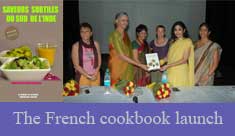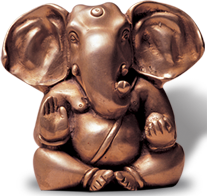

 SAVEURS SUBTILES DU SUD DE L’INDE
SAVEURS SUBTILES DU SUD DE L’INDE[French Cookbook]
It has been a fantastic journey for Sophie and Viji. Meeting at a farmer’s market and discussing on the aspects of the okra led them both on a journey of discovery - a mingling of an Indian mind to the subtle flavours and experimentations of a French mind. Needless to say this book has gone on to receive a Gourmand award as the ‘The Best Translated Book In the World' - Second Place. The original English book has won a Gourmand Award also.
In this ancient cuisine of the South, food or ‘Annam’ as it is referred to in Sanskrit forms the essence and spirit of God himself – the words in Sanskrit saying ‘Annam Parabramham Swaroopam’ meaning that all living beings are born and live by food; they finally get back to the earth and merge in it to become food. Food is the supreme medicine and healer of all – ‘Aushadham Uchyate Sarvam’. In a Hindu household food occupies an integral part of life. It is offered to ancestors during rituals, to one’s personal deity at home before it comes to the dining table; this neutralizes harmful energies that may be present in the food. The priests offer to the Gods in the temples which is then served to the devotees. It is offered to the poor and homeless as ‘seva’ (charitable service), to the animals and birds as a religious duty, In a Hindu home the children are taught not to disrespect or reject food. Unannounced guests are entertained with whatever food has been prepared for that day.
Ayurveda teaches us that the food we eat has a direct influence and effect on the 3 qualities of sattva, rajas and tamas. This in turn influences the balance of our minds and bodies. The shastras, or ancient doctrines laid down by our seers prescribe rules to be observed before, during and after eating food; like specifications on what kind of food to be eaten, in whose company and what dishes to be served. Alas these rules have become impracticable these days. However one can still say that different spices play an important role in the dishes; for example, fenugreek acts as a digestive aid, cumin has multiple usages, dried legumes and beans act as nature’s tiny capsules of proteins, pepper is also used for colds and coughs, turmeric acts as a natural healer for wounds; in fact, each and every ingredient used in the Tamil Brahmin cuisine has a purpose that goes beyond taste and texture. Every part of the banana tree has been useful to the housewife. It was grown in the backyard of every dwelling and was easily available to one and all. That may have been the reason why the ripe banana is an integral part of religious ceremonies. Growing buying, cooking a vegetable is a voyage of discovery. The ancients knew it and this community, had imbibed and adapted the lore of these sages into their daily life. ‘Anna Dhaatha Sukhi Bhavaa’ - may the one who provides food be happy - says it all!












